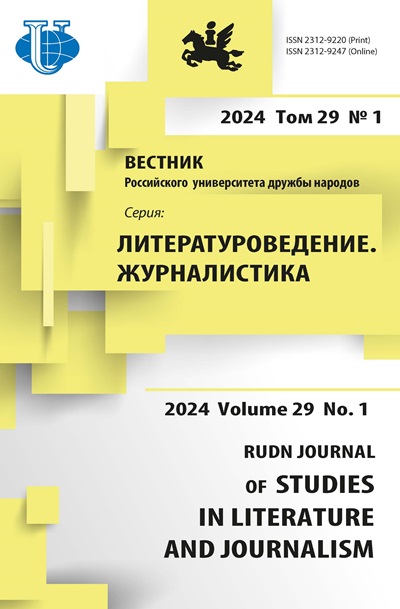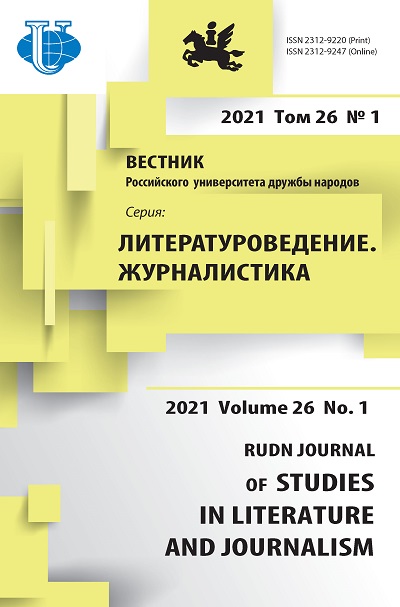Жанровая характеристика передач британского телеканала «Би-Би-Си 1»
- Авторы: Горобий А.В.1
-
Учреждения:
- Тверской государственный университет
- Выпуск: Том 26, № 1 (2021)
- Страницы: 115-122
- Раздел: Журналистика
- URL: https://journals.rudn.ru/literary-criticism/article/view/26084
- DOI: https://doi.org/10.22363/2312-9220-2021-26-1-115-122
Цитировать
Полный текст
Аннотация
Актуальность исследования определяется тем, что телеканал «Би-Би-Си 1» представляет интерес, прежде всего, как образец общественного телевидения, сохраняющего престиж и конкурентоспособность в глобальном рыночном медиапространстве. Целью является анализ эфира «Би-Би-Си 1» с точки зрения форм журналистского и операторского творчества. Для проведения исследования была выбрана семиотическая методология, которая позволяет интерпретировать знаковые системы, будь то журналистские тексты или телевизионные кадры, как взаимосвязанные явления культуры. В результате выявлены важные социокультурные и мировоззренческие элементы, заложенные в телепередачах «Би-Би-Си 1» и определяющие их жанровый профиль. Таковыми являются социальная миссия общественного телевидения, сочетание региональных и столичных мотивов, преобладание серьезных информационных передач. Кроме того, программы открыты для развлекательной продукции, в том числе импортной. Имеет место также визуально-эстетическая адаптация дотелевизионных культурных форм театра, бульварной прессы и т. д. В связи с этим можно говорить о гибкой программной политике «Би-Би-Си 1», которая может быть полезным примером для разработки стратегий развития общественного телевидения в других странах.
Ключевые слова
Об авторах
Алексей Викторович Горобий
Тверской государственный университет
Автор, ответственный за переписку.
Email: alexogor@mail.ru
кандидат исторических наук, соискатель кафедры журналистики, рекламы и связей с общественностью
Российская Федерация, 170002, Тверь, пр-кт Чайковского, д. 70Список литературы
- Борецкий Р.А. Беседы об истории телевидения. М.: Икар, 2011. 178 с.
- Голядкин Н.А. История отечественного и зарубежного телевидения. М.: Аспект Пресс, 2014. 191 с.
- Любимов Б.И. Общественное вещание: британская модель. М.: ВК, 2006. 279 с.
- Орешкина Н.Е. Общественное телевидение в информационном обществе: британская модель: автореферат дис.. к. ф. н. М.: МГУ, 2005.
- Покровская С.И. Жанр мини-сериала Би-Би-Си в условиях коммерциализации телевидения Великобритании: автореферат дис.. к. ф. н. М: МГУ, 2010.
- Broadcasters' audience research board. Weekly TV set viewing summary (Jan 2010 - Jan 2020). URL: https://www.barb.co.uk/viewing-data/weekly-viewing-summary (accessed: 27.07.2020).
- About the BBC. Mission, values, and public purposes / BBC. URL: https://www.bbc.com/ aboutthebbc/governance/mission (accessed: 27.07.2020).
- Information about BBC English regions / BBC. URL: http://www.bbc.co.uk/england/ about.shtml (accessed: 27.07.2020).
- Nairn A. Mid-80s BBC One: the benefits of one big relaunch over piecemeal changes // Clean Feed. URL: https://cleanfeed.thetvroom.com/3312/opinion/mid-80s-bbc-one-thebenefits-of-one-big-relaunch-over-piecemeal-changes (дата обращения: 27.07.2020).
- BBC One. Question time. Frequently asked questions. URL: https://www.bbc.co.uk/ programmes/articles/5HrMm77Yz7vwzCZZ570nTdp/frequently-asked-questions (accesssed: 27.07.2020).
- Bignell J., Lacey S. British television drama. Past, present, and future. London: Palgrave Macmillan, 2014.
- Booth R. Doctor Who one of biggest shows in the world, says BBC following ‘simulcast’ // The Guardian. 2013, 24 November. URL: https://www.theguardian.com/tv-and-radio/2013/nov/24/doctor-who-biggest-show-world-bbc-simulcast (accessed: 27.07.2020).
















